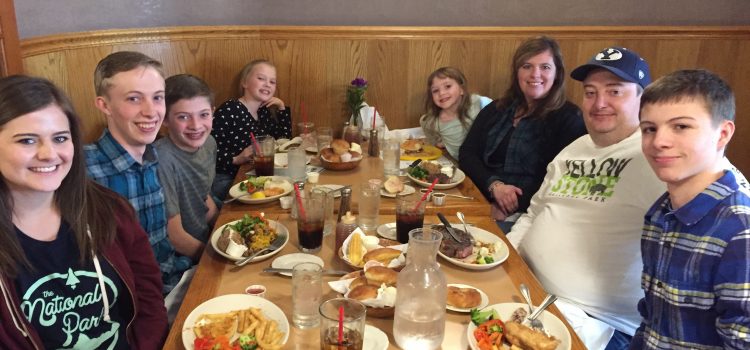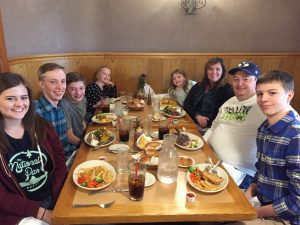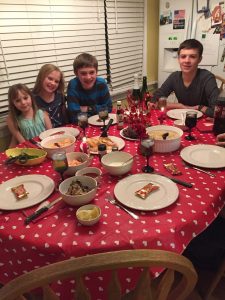
Where is the perfect place for conversation starters for family? The dinner table of course! How do I know this? I’ve see it daily in my own home. Table talk unfolds the story of your family – past, present and future.
In the past four months of pandemic craziness, dinner table conversations have been the highlight of the day for me. We haven’t been running off to soccer, football or dance practice and we have the ability to sit around and talk long after the food is gone. How has it gone in your home?
Before March, when kids hit the teenage years, nights around the dinner table come few and far between it seems, but we try to gather around as often as possible. I see some of those old pre-pandemic habits returning as things are starting up again. I feel a little lamentation about that, but I think we have remembered some of our old traditions and they will stick longer because we enjoy it so much.
Dinner Table Conversations

Strengthen bonds and help children be more resilient through intentional conversations. Get our prompts to spark lively discussions and create a culture of storytelling.
Some nights are crazy and for any mom dinnertime can be the most stressful time of the day, but as the meal nears the end, it can also turn rewarding. I can’t count the number of times my 13-year-old daughter pleads with her dad at dinner, “Dad, tell us a story about you and Murray O’Dell!” Murray stories at our house are the stuff of legends. Stories of tying strings to lawn furniture across the street so when cars drove through it the furniture would fly or more touching stories of the boys hearing a voice telling them to run while sitting under a cherry tree in the backyard. After the third warning the boys took off and the tree fell.

The sad irony behind dinnertime “Murray” stories is that he was tragically killed in a car accident 14 years ago, but to my children he is very alive in their memories. And he is for my husband, too. Telling stories of his best childhood friend has kept his memory alive and well and let my children know that their dad (who follows rules in all circumstances) did a little mischief in his youth. Those stories can do so much for your kids.
Dinner table talk is also where stories have unfolded about my Dutch ancestors and their journey to Utah so they could live their religion to its fullest or how my grandpa remembers the horse-drawn hearse as it carried his dad through the streets of Ogden, Utah, when he was only 12 years old.
Related: Pioneer Stories Help us to Work Harder, Be More Grateful
We have all heard the studies about dinnertime and the importance of eating around the table and creating conversation – food and conversation go together, but what do you talk about around the table? One of the perfect conversation starters for family dinner table talk can be about family stories of our youth, our ancestors or even our kids. I have found that nothing lights my children up more than re-telling the story of their birth or their early years. Every year on the eve of my children’s birthdays I try to tell them about the day they were born. This year I told my 8-year-old her story. I think it was one of the first times it really sunk in for her. She then re-counted the story at Sunday dinner the next week in front of the whole family, including grandparents. It was sweet and rewarding to hear her talk about how much she was loved and adored from the moment she was born.
Related: How to teach your kids to be confident and resilient
Table talk and conversation starters don’t have to be around a big meal either. Almost every Sunday after church we make “muffins” which consists of the inexpensive rolls in a can rolled in melted butter, cinnamon and sugar and baked for about 10 minutes. The family gathers around to talk about what they learned at church which often morphs into more personal discussions or often in jokes and laughter (and let’s be honest sometimes bickering, especially when it comes to clean up time!)
Magic happens at the kitchen table, especially if we make a goal for it to happen.

Related: Family recipes and family stories go together
Seven ways to share family stories and make memories at dinnertime
- First I would say if dinner table talk and family memories aren’t in the rotation right now, just start. It doesn’t have to be every night. Heaven knows there are many nights this can’t happen. So start small. And if some family members are missing, that’s okay, too. Even if ends up just being a couple of you, gather around the table and talk. Put away your phones. I admit we don’t have a hard and fast rule about phones at the table, but we try. I would encourage a “no media at the table” rule for sure.
- Cook with your kids. Dinnertime isn’t always about the eating. We have a rotation in our family – a certain number of kids help me cook and some help clean. We rotate the schedule around depending on who is around and what times. We listen to music, talk about life and we often talk about the recipe we are making and why we love it and where it came from. We use family recipes a whole bunch, so it often morphs into a conversation about that person’s recipe. We also have a church cookbook we use and we share stories of that person too – because oftentimes the people we go to church with feels a bit like family.
Related: A missionary, a family story and the Paradise fire
3. At dinner, make it a night where you talk about one family member, living or dead. Take turns picking and share one or two stories about that person. A fun idea is to rotate around. One day pick someone at the table, another day pick an ancestor, another day pick a grandparent or aunt or uncle.

4. Make table time a love fest. When my older kids started into the tween phase there seemed to be so much fighting and snapping at each other. I wanted my kids to love each other so we started a tradition: at the beginning of the meal we would say one good thing about the person to the left of us. We would switch it up every night so it was to the right, or two down and so on. We had some pretty special moments within our family and the conversation would often turn into great family stories. We don’t do it as regularly now, but I do throw it in every once in a while when things are a bit contentious at home. It is more than satisfying.
5. Make a favorite recipe of a family member and talk about why they love it. This works for living or dead, living with you or apart from you. Some weeks I pull one of my kids aside and ask them to tell me three things they would like for dinner that week and then I make all those meals for them. We celebrate them just a bit. They feel extra loved and everyone eats well because often one child’s favorite meal is another one’s, too. Full tummies generate great conversations!
6. Don’t get impatient. As moms, we often get caught up in all the tasks we have to do. I write this so I will take my own advice. If there is some great talk happening, especially about family stories and memories – don’t be in a hurry. These will be the moments you long for in five years.
7. And finally, if you want a perfect conversation starter in your family – just eat already!
Dinner Table Conversations

Strengthen bonds and help children be more resilient through intentional conversations. Get our prompts to spark lively discussions and create a culture of storytelling.
 Rachel J. Trotter is a writer at Evalogue.Life, where we tell personal and family stories that inspire, and help you tell yours. She has worked as a writer since her college days over 20 years ago. She loves telling people’s stories. She lives in Ogden, Utah, is busy raising six children, and loves working on family history alongside her husband, Mat.
Rachel J. Trotter is a writer at Evalogue.Life, where we tell personal and family stories that inspire, and help you tell yours. She has worked as a writer since her college days over 20 years ago. She loves telling people’s stories. She lives in Ogden, Utah, is busy raising six children, and loves working on family history alongside her husband, Mat.

Pingback: How do you turn family vacations into family stories? Here are some tips. | Meridian Magazine
This is such a great idea. I think it gives so much confidence when they have everyone’s undivided attention like that. And you know it was successful because they came with a topic ahead of time! Thanks for sharing!
During dinner, when our boys were at home, everyone had to share something from their day. This included my husband and I. The time and topic belonged to the person whose turn it was to talk, no one could hijack the conversation, although questions and comments were allowed.
Once the boys got use to the idea, they would come to the table with an event already chosen. It was a great way to learn what was going on in their lives. We also did a weekly game night which encouraged conversation.